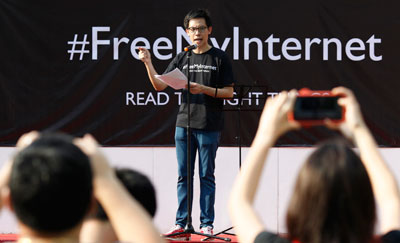A critical Singaporean blogger continues to suffer financial and legal pressure because of a blog post that allegedly accused the city-state’s prime minister, Lee Hsien Loong, of corruption. The episode is part of a disturbing pattern of government legal and financial pressure on critics, but it is also a lesson in how censorship can backfire.
Last month, Roy Ngerng Yi Ling wrote for CPJ about how he was served legal notice, including a demand for an apology to Lee and a “written offer of damages and costs” following his May 15 post on the Central Provident Fund (CPF), the government’s compulsory pension program. Lee’s lawyer alleges that Ngerng accused the prime minister of “criminal misappropriation” of money paid by Singaporeans to the CPF.
On his blog, The Heart Truths, Ngerng, who is also a health-care worker, has frequently posted critical commentary on the People’s Action Party, which has ruled Singapore since 1959.
Ngerng took down the offending post (now being hosted here) and removed the links from his social media accounts. He also removed four other posts and issued a public apology on his blog. In addition, Ngerng offered 5,000 Singapore dollars (US$4,000) in damages to Lee.
Ngerng’s actions were dismissed as “derisory” by Lee’s lawyer, and the prime minister is pursuing a lawsuit–making Ngerng the first online critic in Singapore to be sued by a leader, according to news reports. Ngerng’s lawyer has filed defense papers arguing that there was no case of defamation and no grounds for the aggravated damages, according to reports. A pretrial conference is scheduled for July 17, at which point court dates will be decided, Ngerng told CPJ.
Ngerng has also been fired from his job at a local hospital–a move that he sees as politically motivated. A press release by the hospital said Ngerng’s conduct was “incompatible with the values and standards we expect of our employees. While our staff are free to pursue their personal interests outside work, they must conduct themselves properly, honorably, and with integrity. In particular, they cannot defame someone else without basis, which essentially means knowingly stating a falsehood to the public.”
Ngerng told CPJ he has also been denied access to public events related to the CPF, a subject he continues to report on. However, he has garnered media attention and he says he has raised funds for legal fees using crowdsourcing.
While Singaporeans are divided on whether Ngerng’s actions have been appropriate, it is clear that attention to the dispute has opened a wider conversation about the CPF. On June 7, a few thousand people attended a protest in support of Ngerng and against the way the CPF is managed. The government has also begun to explain the CPF through local media and other outlets, according to a local journalist who spoke to CPJ on condition of anonymity for fear of repercussions. “It’s [a] story written out of distrust in the government. But the truth is, the CPF system is [way] too complicated, even staff who work for the agency managing the funds don’t understand how it works…The issue is also borne out of a serious asymmetry of information–you cannot blame people for making conspiracy theories when the government refuses to be fully transparent about the system,” the journalist told CPJ by email.
Bloggers play a crucial role in Singapore, where there is little independent journalism, and that which does exist knows to curtail criticism of the government lest reporters or publications be sued for defamation. Most of the country’s media are directly or indirectly controlled by the government, and self-censorship is prevalent.
Thus, the concerted effort to pressure Ngerng may have a chilling effect on the already-narrow space for critical and independent reporting. But it may also wedge open the door to more debate.
